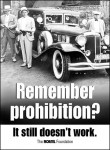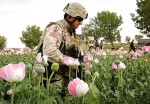 The War on People Who Use Drugs, colloquially known as the “drug war”, turns 40 next week. Although the U. S. government has criminalized various substances used for medicinal or recreational purposes for nearly a century, the modern drug war began during the Nixon administration, with his announcement that the U. S. government would actively prosecute a “war on drugs”. This followed the passage of the Comprehensive Drug Abuse Prevention and Control Act of 1970; Nixon then established the Drug Enforcement Administration in 1973 to oversee all of the government’s interdiction efforts. Since then, the drug war has consumed more money, and more lives, than any of the drugs which the state has aimed to eradicate, and has completely failed to achieve any of its intended goals. Drugs are more available than ever before, and although usage has gone down for some drugs (and increased for others), it can be attributed as much to changing tastes in recreational drug usage as to the state’s interdiction efforts.
The War on People Who Use Drugs, colloquially known as the “drug war”, turns 40 next week. Although the U. S. government has criminalized various substances used for medicinal or recreational purposes for nearly a century, the modern drug war began during the Nixon administration, with his announcement that the U. S. government would actively prosecute a “war on drugs”. This followed the passage of the Comprehensive Drug Abuse Prevention and Control Act of 1970; Nixon then established the Drug Enforcement Administration in 1973 to oversee all of the government’s interdiction efforts. Since then, the drug war has consumed more money, and more lives, than any of the drugs which the state has aimed to eradicate, and has completely failed to achieve any of its intended goals. Drugs are more available than ever before, and although usage has gone down for some drugs (and increased for others), it can be attributed as much to changing tastes in recreational drug usage as to the state’s interdiction efforts.
And at what cost?
- Government at the Federal, state, and local levels spent $40 billion on the drug war in 2010. And that doesn’t count U. S. aid to Mexico for its drug war efforts, which totaled an additional $50 million.
- The increased funding to state and local law enforcement has led to a rapid militarization of civilian police forces. This map (created by Radley Balko) shows the proliferation of violent, SWAT team-led drug raids which have resulted in the deaths of people who have not been shown to be involved in the drug trade, most recently Jose Guerena.
- Draconian “mandatory minimum” sentencing, which in some cases has mandated life sentences without parole for possessing certain amounts of drugs, has sent prison populations skyrocketing; the U. S. incarcerates more people than any other country in the world. Blacks and Latinos are especially hard-hit by the drug war, as police frequently target them in drug crackdowns.
- Prosecutors have targeted doctors whom they believe are illegally prescribing pain medication, and have harassed and threatened those who speak out against the persecution.
- The funding of drug interdiction efforts in other countries by the U. S. government, beginning in Colombia
 in the 1980s and continuing to the present day in Mexico, fueled a protracted and bloody war between the government and drug cartels. Nearly 40,000 people have died in Mexico since President Felipe Calderon, with the direct support of the Bush and Obama administrations, stepped up war efforts against the drug cartels in December 2006. In Ciudad Juarez alone, more than 3,000 murders occurred in 2010; its homicide rate is 4.5 times higher than New Orleans, the current U. S. “murder capital”.
in the 1980s and continuing to the present day in Mexico, fueled a protracted and bloody war between the government and drug cartels. Nearly 40,000 people have died in Mexico since President Felipe Calderon, with the direct support of the Bush and Obama administrations, stepped up war efforts against the drug cartels in December 2006. In Ciudad Juarez alone, more than 3,000 murders occurred in 2010; its homicide rate is 4.5 times higher than New Orleans, the current U. S. “murder capital”.
Even as the evidence piles up against the effectiveness of the drug war, the statist media continue to foment hysteria over the next grave danger facing American youths. In the 1980s, it was crack, as alarmist government-led propaganda created a moral panic that raised crack’s profile and possibly fueled its rapid proliferation throughout American inner cities. These days it may be salvia. Or nutmeg. You never know if your spice rack holds the gateway drug that enslaves the minds of your children.
This is not a “war on drugs”. It is a declared war on the people by their government. Even if one believes the state, at a minimum, is necessary to protect life, liberty, and property — a sentiment I don’t share but recognize that many libertarians do — once it begins attacking, killing, and imprisoning its own citizens for the non-crime of voluntarily selling or using plants or chemical substances, the state loses any moral authority to govern.
And now Russia is declaring a “total war” on drugs. Either the Kremlin has developed highly selective amnesia, or just hasn’t paid attention over the past 40 years as other countries have tried, and miserably failed, to stem the flow of illicit drugs. But given Russia’s historic tendency to totalitarianism, this just proves that the drug war isn’t about protecting innocent people from the evil purveyors of narcotics, but about extending and entrenching state power over everyone’s lives.
Until we assume responsibility for our own actions, and reject the state’s authority to rule over us, the drugs, cash, and blood will continue to flow unabated.

Homerun, Brian.
Thanks!
Drug prohibition is more than 40 years old. Americans lost the right to self-medicate in the early 20th Century.
While rightly objecting to prohibitions on the use of intoxicants, libertarians are strangely mute about the prescription drug laws that force Americans to get permission from government agents (physicians) to use almost all other medicines. That is probably because libertarians, like most people, wrongly perceive doctors to independent rather than licensed agents of the state. Against all logic, many libertarians actually advocate putting marijuana control into the same medical hands that control access to prescription drugs.
Thomas Szasz has spoken out strongly for years against all prohibition, and against shams like “medical marijuana,” but he is overlooked even by most libertarians.
Mr. Martin:
Americans still have the right to self medicate. They just have to do it legally. Anyone can go to the drug store and by mild cold remedies, pain killers, etc.
It takes alot of schooling, to become a medical doctor.
And people don’t get “permission” to use a drug, they get a “prescription”.
Marijuana addicts just may not want to admit, that they have a “mental health problem”. They say, they can quit anytime, but they probably don’t realize that, it is a “psychologically addictive” substance.
Thanks for your comment, Nicolas.
I am aware that the government makes it very difficult, if not impossible at times, for people to obtain medication. I referenced one of the worst examples, that of prosecuting doctors for prescribing pain medication, in my post.
I don’t think all libertarians wrongly perceive the role doctors play in enforcing statist drug laws. I am opposed to all medical licensing requirements, just as I am opposed to all government prescription requirements. There should be no restrictions whatsoever on people obtaining whatever medication they feel they need, just as there should be no restraints on doctors to counsel patients and prescribe such medications.
But that is but one narrow aspect of the larger drug war. To catalog every crime of the state in enforcing this useless and idiotic war would probably require far more than a single blog post.
Forgive pls my english. I am foreigner. I agree with you in a great part, but you don’t mention a very important thing: with this absurdn system drug dealers earn money in such quantities that normally is measured according to the weighth. They are not willing at all free drugs. We are idiots.
Thanks for your comment, Ignacio, and I think you are correct. The drug cartels are not heroes. They have a vested interest in keeping the drug war going, as it increases their power, just as it does for the government.